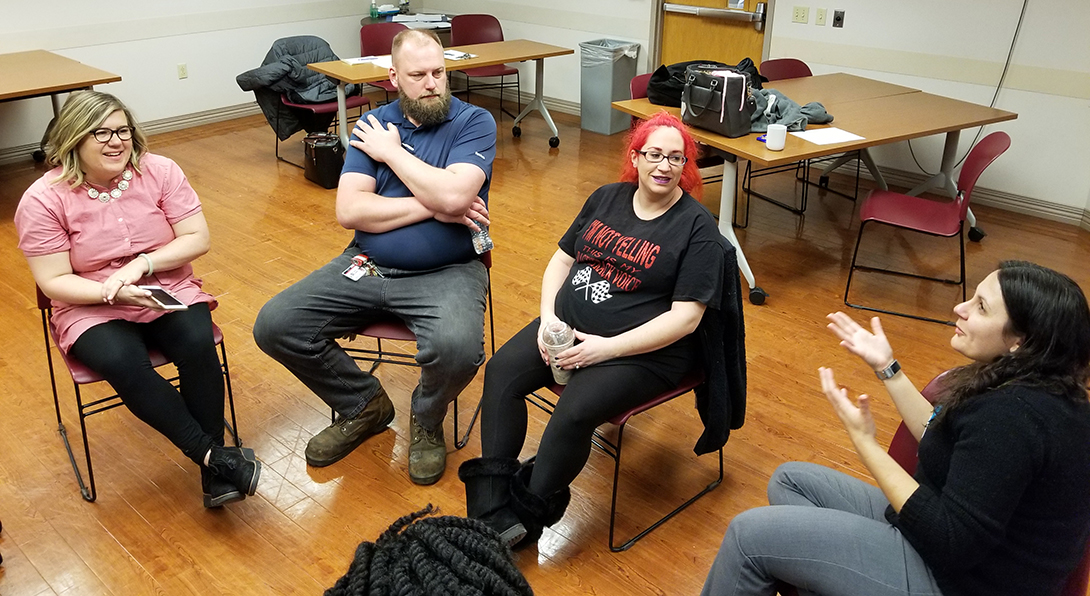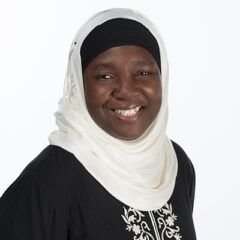Centering Pregnancy in Peoria Focuses on Improving Maternal, Newborn Health

“It’s like a bunch of girlfriends talking” is how Jodi Clougherty of Chillicothe describes Centering Pregnancy, a program launched in 2017 by the UICOMP Family and Community Medicine Department. Centering Pregnancy is a model for providing group pre-natal care that allows expectant mothers more “face time” with their providers and an opportunity to learn and share with other women in a similar stage of pregnancy.
“It’s an evidence-based model that we wanted to bring to Peoria because of the high rate of pre-term births and low birthweights,” says Kari Watts, DO, clinical assistant professor of Family and Community Medicine. The program was recommended by Anna Grady, MD, a fellow in the UICOMP department’s obstetrics fellowship, who had seen a Centering Pregnancy program thrive in Muncie, Indiana.
The two factors of pre-term births and low birthweights are associated with a higher risk of long-term health problems and infant death, especially in cases of extreme prematurity. The pre-term birth rate for Peoria County is 10.6 percent, compared to the national average of 9.8 percent. However the disparity for pre-term births for Black/African American babies is 13 percent compared to 9.7 percent for white babies, according to the 2017 Peoria County Maternal and Child Health Report. Additionally, the report indicated the pregnancy rate for Black/African American teens was four times higher than for White teens (ages 15-19).
Key findings also indicated the teen birth rate in the high-risk zip codes of 61603, 61604, and 61605 was 58.5 per 1,000 females age 15-19. And, for the remaining Peoria County zip codes, the rate was 9.2.
Disparity was highlighted by the needs assessment conducted by the Peoria City County Health Department, says Rahmat Na’Allah, MD, obstetrics fellowship director with UICOMP Family and Community Medicine.
Dr. NaAllah quote

“Evidence indicates the Centering Pregnancy program mitigates the racial disparities and narrows the gap for women of color.”
| Family Medicine Obstetrics Fellowship Director
Article continued
A Centering Pregnancy cohort consists of women in similar gestational age and typically starts at 10-16 weeks gestation. The women attend 10 pre-natal group visits during their pregnancy. Each 90-minute meeting has the same structure and starts with the women taking their own blood pressure and weight, and charting it in their notebook which also includes educational materials. Each patient receives one-on-one time with the care provider. The cohort participates in facilitator-led group activities and discussion with an opportunity for education and sharing. Topics may range from the discomforts of pregnancy to breastfeeding.
As a provider, Watts says Centering Pregnancy brings many benefits to her as well. “We learn so much from the things they say in 90 minutes that would never come out in 15 minutes,” she says, referring to the typical face time between a provider and patient.
Clougherty’s husband, Cory, accompanied her and encouraged her participation initially.
Jodi says, “Having the adult interaction and talking with other women in my boat when my other friends are not pregnant is really kind of nice. It’s like I get to hang out with friends for one-and-a-half hours instead of a doctor’s appointment.”
“And believe it or not, with this being our third kid, I’ve actually learned some things. I’ve learned a lot about nutrition and other forms of birth control,” Jodi says. “There are some first-time moms in the group, and I can share my experiences.”
The curriculum for Centering Pregnancy is offered by the Centering Health Institute headquartered in Boston.
Locally, the initiative is offered as a collaboration among the Peoria City County Health Department, UICOMP Family Medicine, the March of Dimes, UnityPoint Foundation, and Heartland Health Services.
Pathways
This article is part of the Spring 2020 edition of Pathways. Read the full issue.